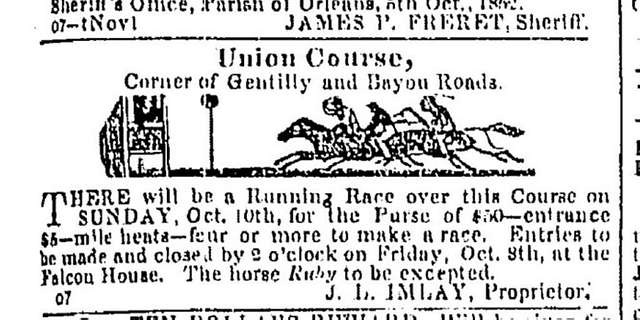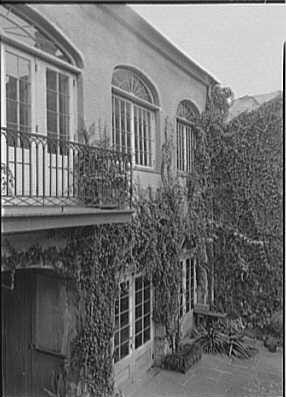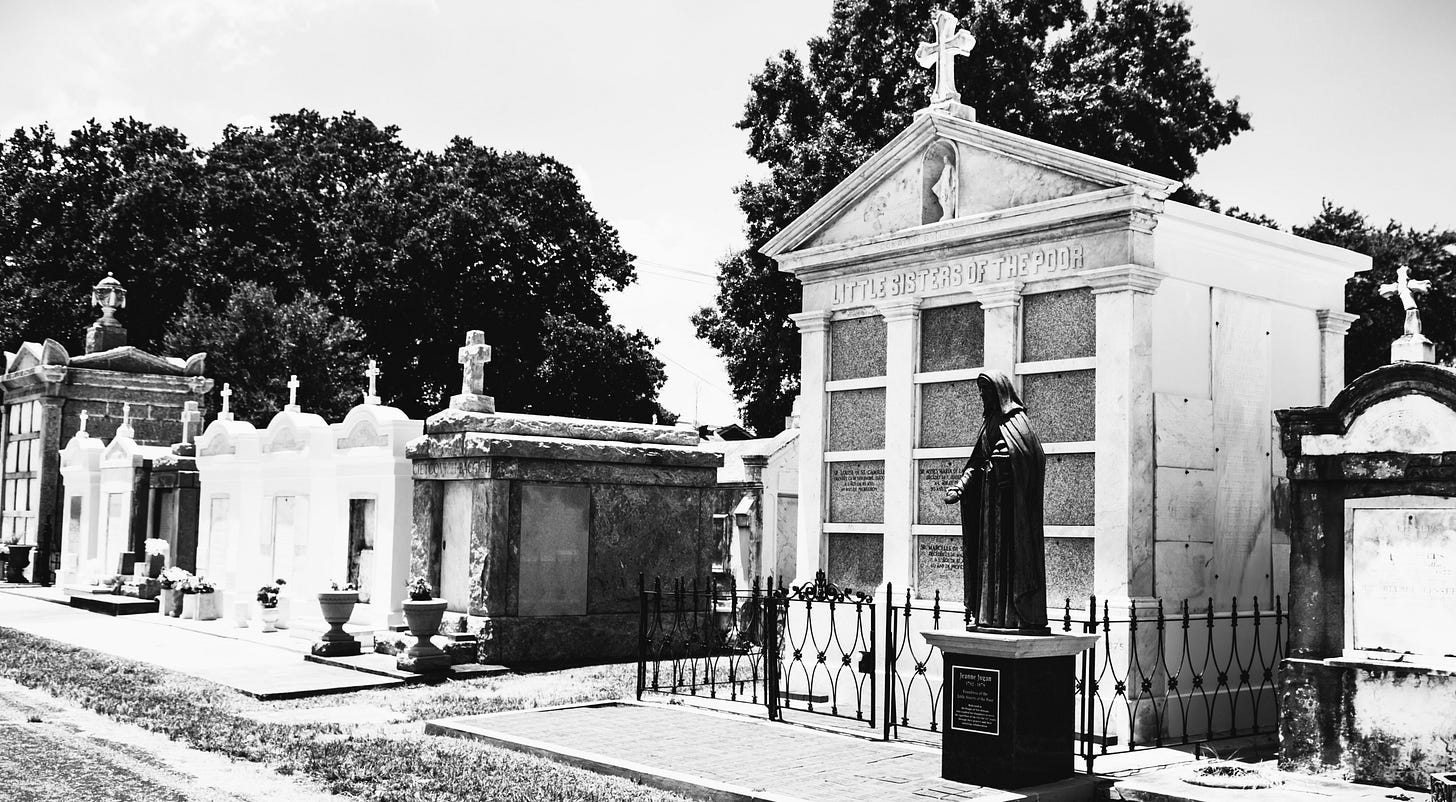-- The Daily Picayune, Tuesday’s Evening Edition, November 9, 1852
Perched atop of the roof of his large rusty iron cage, the African grey parrot tilted his stoutly feathered neck and surveyed the red-brick courtyard, musing on where to fly next. His cage was merely an accessory at this point—a freestanding reminder that at one time, long ago, this parrot lived in the inferior rank of “pet.” Since arriving at the home of Monsieur Dubois, however, the bird, having done a quick study on his new master and sensing a weakness, had gone about spending his avian hours angling into the Monsieur’s evanescent intolerance so as to arrive to this day, in the fall of 1852, where the bird could now live out the rest of his feathered existence not as a caged, but a courtyard, resident. It was not that Monsieur Dubois did not try to rid himself of the bird. He regularly left open its cage door, trying to frighten the overly articulate avian away. But invariably he would soon find the parrot resting on his straw nest, his black bill tucked tenderly underneath his wing. He was, after all, a happy bird. And so, feeling so contented with his environs, the African grey parrot simply would not, could not, fly away.
“I should take a pistol to that bird,” said Monsieur Dubois, taking aim at the parrot with his long slender fingers, and shooting playfully.
“He’s a pest…Envahisseur!” he yelled, watching the bird fly to the upper reaches of a magnolia tree. The houseboy entered the courtyard carrying that afternoon’s Picayune on an ornate silver tray and approached Monsieur with a slight bow. The Monsieur, without acknowledgment, snatched the paper from the tray and began devouring the days’ cotton prices.
Overhead his daughter, Sophie, leaned out of her bedroom window to scan the courtyard below.
“Maggie!” she yelled, peering into the windows of the lower servant rooms. “My blue felt bonnet…bring it here s’il vous plait!” Waiting for an answer and finding none, she shook her head and sighed. “For the life of me…I spend every waking moment waiting on that girl…Maggie!” Sophie cast her gaze toward her father and watched as he tore another bit of nail from his fingertip. “Papi, you are going to chew yourself down to your quick if you don’t stop! Qu’est-ce qui ne va pas? You seem so worried lately.”
“Tout va bien…nothing for you to worry about,” Monsieur grumbled as he waved away his daughter’s attention. “Business…just business.” He crumpled up the newspaper, tossed it to the floor, and began pacing.
“Papi” she called again. “Has the Ursin carriage called yet? You see, last night I saw Isabelle at the Opera and she asked us to join them in their box at the racetrack next weekend. The season is ending and she made a great display about how they must have us join them. She said that an invitation would be arriving by carriage this afternoon.”
The Dubois home was considered one of the finest in the French Quarter and emblematic of the naturally superior culture and refinement of the French. This was by design, of course, and of particular importance to Monsieur Dubois, who had been historically troubled by the influx of Americans since the Purchase. His home was a sanctuary away from the waves of drunken, semiliterate Kaintocks that he saw step off the southbound steamboats now—a meticulously crafted Francophilia refuge. His vision was precise. A visitor arriving by carriage was ushered into a large arched porte-cochere, flanked on either side by lanterns that were gas-lit each evening precisely at 8:00 p.m. Upon passing through a walkway, the visitor entered a large elegant courtyard offering both refreshing crosswinds and jungled tranquility, animated by broad feathered ferns and slick-leafed banana trees that dangled heavy heads of yellow fruit in the spring. A door located at the front of the courtyard gained entrance into an intimate salon furnished with opulent wing-tipped chairs surrounding a hand-carved pink marbled table that the Monsieur’s wife, Jacqueline, had shipped from France just months before her death. Two crystal chandeliers hung suspended overhead, casting out flecks of scattered candlelight into dark pockets of the room and ricocheting, in greater multitude, off a carved walnut mirror that hung discretely over the fireplace. Such calculated imagery, however, was not limited to the home’s interior. Rather, set on inspiring the envy of the entire French Quarter, the Monsieur hung lattice ironwork so beautiful that even the esteemed architect Benjamin Latrobe ultimately had to agree that the Monsieur’s balconies were far lovelier, and in much better taste, than the garish balconies of the LeBranche House nearby.
“Papi, did you hear me? Has the Ursin carriage arrived?” Sophie said. “We have not received an invitation to the racetrack in so long…good invitations have all but dropped off since mother died. Honestly, at my age you should be grateful that Isabelle has taken an interest in me.”
Monsieur Dubois stopped pacing and yelled in a voice that echoed from his most primordial bones. “No daughter of mine will have her status defined by Isabelle Ursin. The disgrace! You know that those swamp rats have actually entertained that backwater Zach Taylor in their home…in their home, I say!”
Sophie sighed. “President Taylor, you mean?”
“A Kaintock is a Kaintock…”
“Oh Papi! He was the President of the United States…to most people it was an honor.” She leaned further out the window, straining to hear the traffic on the Rue Royal outside. “Oh, never mind him! The carriage…has it come?”
Monsieur huffed. “Came and went. Their calling card is on the table in the foyer. I believe an invitation was, in fact, extended, but shall not be accepted—by you or anyone else in this house.”
“No!” Sophie cried. “I can’t decline an Ursin invitation! What are you saying?”
“I can and you will,” shouted Monsieur, as he reached for his cane and hat.
“Papi, please.”
“That is all I will say on the matter. It is Tuesday…you must ready yourself for your visit to your mother. I have business to attend to at the St. Louis hotel.”
“Papi!”
“Enough!” he shouted and slammed the door behind him.
Sophie rushed down the stairs and grabbed the invitation off the foyer, on which was written the following, in a practiced, most elegant script:
Nouvelle Orleans, 2 November 1852
Monsieur Dubois,
It is my pleasure to invite you and your lovely daughter Sophie to accompany us next Friday, November 12, to enjoy the upcoming races at the Union Course. I am particularly pleased to offer this invitation as it is my favorite event – a pacing race! I am sure you both will quite enjoy it! The carriage leaves from our home on Conti Street at noon. I look forward to your favorable reply.
From your friend very respectfully,
Isabelle Ursin
Sophie turned each word of the letter over in her mind, imagining an afternoon spent in the Ursin’s box. The ladies in their beautiful dresses. The men in their top hats and tails. And all of New Orleans bearing witness to Sophie assuming her mother’s station in French creole society. Such an endorsement would secure her invitations to all the best balls that season. “I just can’t,” she whispered, remembering her father’s last words. “I must go.” She ran to her father’s office, pulled out one of the Dubois family calling cards from the top left drawer of the roll top desk, and hastily wrote a reply.
Nouvelle Orleans, 2 November 1852
My dear Isabelle,
Alas, I am destined to be in Natchez on business that day, but it would be my pleasure to allow Sophie to accompany you as I have always wanted her to see the pacers! With many thanks for the kind invitation, I remain yours,
Monsieur Dubois
Sophie had been making her weekly trip to her mother’s tomb in the Saint Louis No. 2 cemetery for seven years; her father made a point that she should go. “Your mother was a fine woman,” he said. “It is your duty, as her only daughter and direct likeness, to show her the respect that her memory is due.”
Her Tuesday trips took a familiar route. First, she stopped at the flower mart on the Rue Common, a trip that was duplicitously referred to in the ledger as a “visit to the French Market” since her father forbade her from leaving the First Municipality. To the Monsieur, all areas past Rue Canal were a different world leading to a crass gentrified collection of garden homes carved from the corpses of sacrificed old plantations. Home to avaricious Americans and the diseased immigrants who served them. No place for a lady. But Sophie, like her mother before her, preferred the tulips sold by an old Irishman by the name of Patrick Doherty, who, much to the chagrin of the finer Creole ladies, relocated his popular flower shop to the Second Municipality shortly after a small fire destroyed his original store next to the City Exchange. In old man Doherty’s mind, the loss in customers was more than made up for by the comfort of knowing that he was that much closer to the St. Patrick confessional. And, in the end, he found his more loyal clients were quite willing to visit his new environs—even if some now had to do so in secret. Sophie Dubois always arrived close to 3:00 in Tuesday afternoons, and so, at 2:50 Mr. Doherty set about picking a half dozen of his freshest pink tulips, wrapped them in the pages of yesterday’s Bee, and walked out to meet her carriage.
“Sweet lassie…how I do love our Tuesday meetings. It’s always so nice to see you,” he said in his lilting Donegal accent and squeezed her hand. “Say hello to your dear mother for me.”
As he handed her the flowers through the carriage window, Sophie smiled and passed him a one dollar note. “I will,” she responded. “You were always her favorite.”
“She was a beautiful woman. You favor her in every way.”
Sophie felt her cheeks flush. “Merci, Monsieur Doherty,” she said and as the driver clucked, the horses lilted forward.
Turning up Rue Canal, the coachman lightly drew his whip across the horses’ hindquarters, and each proceeded to trot, more quickly now, the brass chains of their harnesses jangling evenly with each step. The road was crowded, well-worn from the bustling traffic. Fledging oaks lined the avenue, in anticipation of long summer days in the distant future, with barefoot boys in torn overalls scaling their waning trunks. Sophie leaned back and studied the buildings as she passed. Millineries advertising velvets, ribbons, and laces imported from France. Bookstores with the latest medical books. Mantillas. Dry Goods. Liveries. Leeches. Law. A business district that had outgrown its wobbly, toddler ways, parented alternately by the French and the Spanish, and now grafted to the Union, had matured with its consolidated constituencies into a fertile commercial peer that could stare down Atlanta, Charleston, and even New York.
Madam Dubois was buried in an area of St. Louis Cemetery No. 2 specifically chosen due to its unobstructed view of the sunrise. And while it was never the intention that any members of the Dubois family would rest anywhere except the family tomb located in St. Louis Cemetery No. 1, Madam Dubois died by cholera and the city elders, fearing the miasmas already rising from the bones rotting along Rue Bassin, pressed to have such infected dead buried in the newer cemetery, further away from the city center. Monsieur Dubois protested, but weak from grief, finally acquiesced after securing written permission from the authorities that, if Madam Jacqueline Dubois was going to rest perpetually in such a lonely, lowly state, he was permitted to honor his wife with the grandest of tombs. And so, within hours of her death, Monsieur Dubois had ordered the most elegant chamber in the city, so that by Sunday, the body of Madam Jacqueline Clélia Beaumanoir Dubois rested, as was most suitable, in a large white marble mausoleum with a wrought iron cross that, at each sunset, christened the neighboring vaults with a most reassuring sacred shadow.
Sophie approached the tomb with the pink tulips and placed them in the grey vase by the sealed door and took a seat at the marble bench nearby. She withdrew a small leather book of the poetry of Alfred de Musset and began to read aloud, entertaining her mother with phrases that she had once loved and knew by heart. Her love of poetry was yet another item that Sophie used to define her mother, having never really known Jacqueline, who she lost at the age of five, long before the memories of a devoted child were allowed to take root. She had no memories of her mother’s voice. None of her touch. Rather Sophie’s memories were a tapestry sewn together from the stories of others. She learned of Jacqueline’s elegant features, her slender fingers, slight build, and long black hair from her aunts. Over card tables in elegant salons, she would listen to her mother’s friends tell stories of the grand balls her mother attended, her generous dinner parties, and most importantly her position as arbiter on all that was socially acceptable in the quarter. It was local legend that on the day that Jacqueline took her last breath, the bells of St. Louis Cathedral tolled mournfully for a solid hour and the Théâtre d’Orléans drew black curtains across its windows and closed its doors for a week.
“There,” said Sophie closing the book. “I read your favorite because today we have something to celebrate.” Sophie removed her bonnet and began to smooth down her hair. “You see I have some good news...great news, in fact! Your good friend Isabelle Ursin has taken notice of me and invited me to accompany her to the racetrack next week and spend the whole day in her personal box. Can you believe it?” Sophie naturally paused to allow for a reply that, of course, was not forthcoming. “Well Mama,” she continued hesitantly. “You probably can, seeing to how close you two were. In fact, you probably spent many afternoons there yourself. But for me, well, this is quite unexpected.” She paused as a cardinal came to settle on the cross of her mom’s tomb and watched it cock his head back and forth and then finally fly over to drink from a puddle of water that had collected in the shallow basin of a marble urn. “Oh, I do wish you were here,” Sophie cried, wiping away a tear. “You see, Papa has forbidden me from going. I have no idea why. But he did. So, I did something that frankly I am not that proud of. I stole his calling card, and writing for him, lied to Madam Ursin, explaining that he was going to be out of town, but that I could go.” She paused when the ugly truth was exposed. “But I had to, don’t you agree, Mama? I was desperate...why this is probably the only invitation I will get this season! I mean, since you died, things just are not the same. All those fine parties you and Papi went to... those nights at the opera? Well, no one comes calling anymore.” The cardinal then took flight and settled on the iron gate in front of her mother’s tomb. “It was just as if the minute your spirit left the house, Papa and I were dead to society as well. So, when someone like the Madam Ursin sends an invitation...well...you see...only a fool wouldn’t go.” Sophie said with a sigh. “Oh Mama, the daughter of Jacqueline Dubois should be the belle of the season, not some charity invite!”







